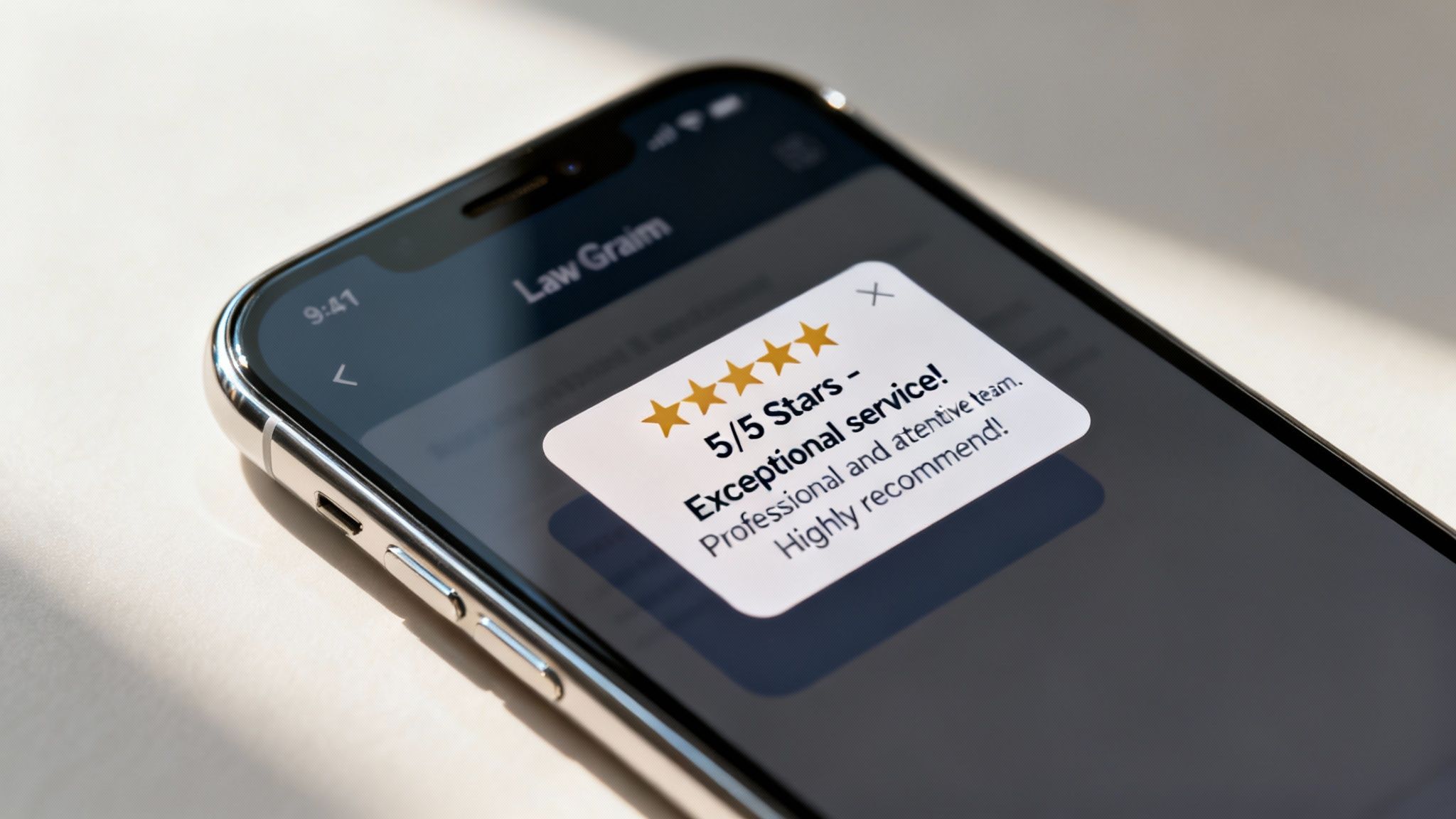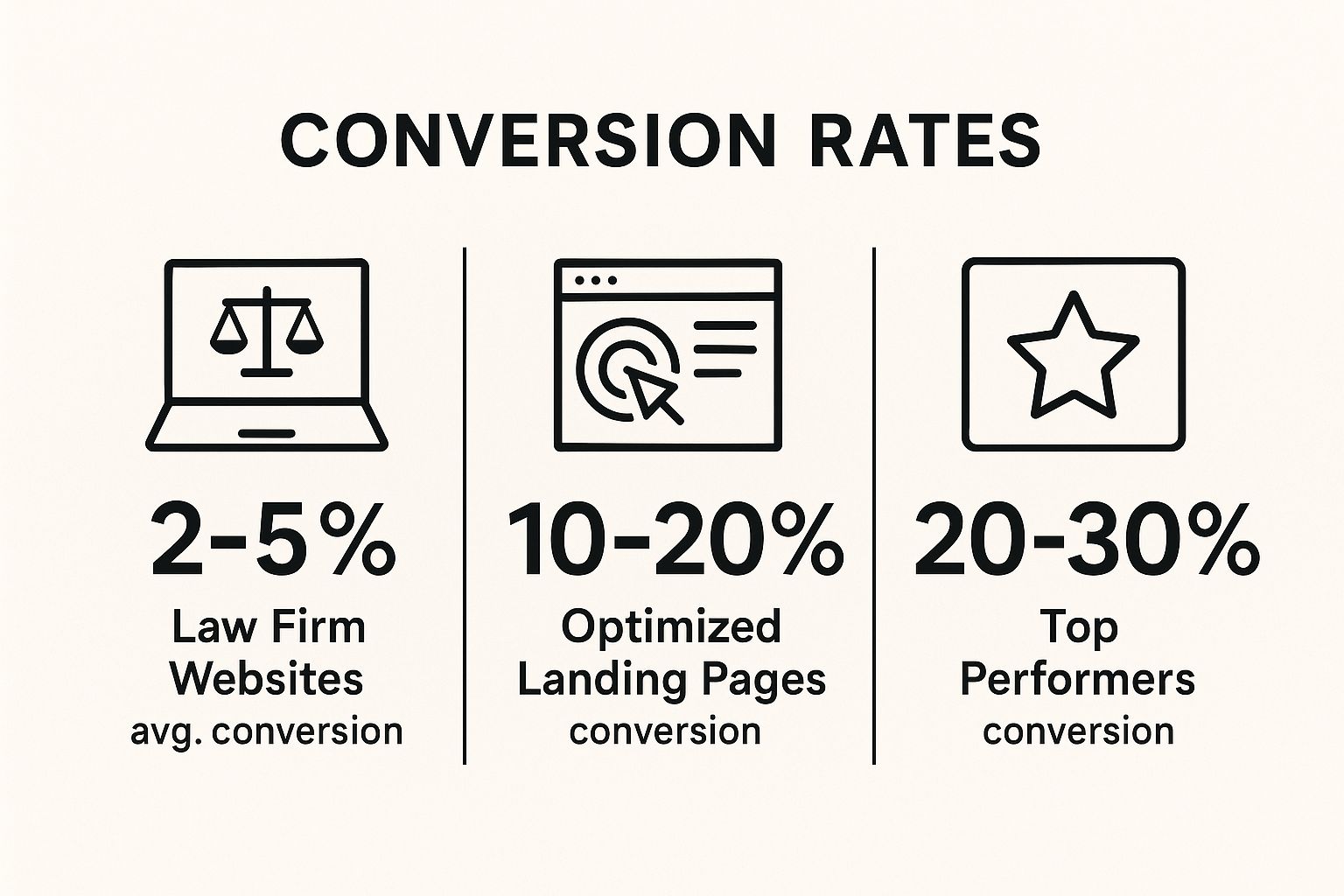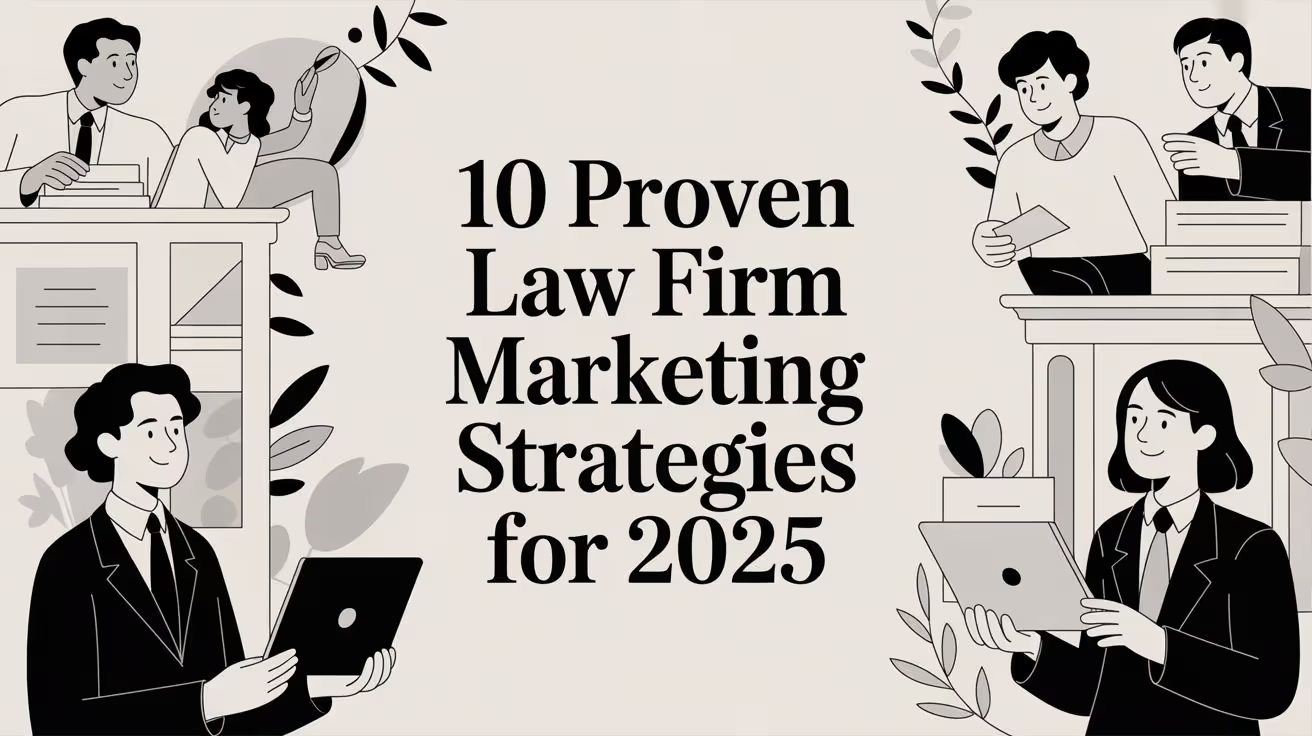In a legal market saturated with competition, relying solely on word-of-mouth referrals is a risky proposition for sustainable growth. The path to attracting high-value clients and establishing market leadership now runs through a sophisticated blend of digital and traditional outreach. Success requires a proactive, multi-channel approach that builds authority, generates consistent leads, and enhances your firm's reputation both online and offline. This playbook is designed to move your practice beyond a passive reliance on its existing network and into a new phase of deliberate, strategic expansion.
This article provides a comprehensive breakdown of 10 proven law firm marketing strategies tailored for today's competitive environment. We will cut through generic advice to deliver actionable guidance on what truly works. You will learn how to implement everything from advanced local SEO tactics that put you at the top of search results to sophisticated content marketing that establishes your attorneys as undeniable thought leaders in their practice areas.
Each strategy is presented as a crucial component of a holistic growth engine. We'll explore practical implementation details for PPC campaigns, client review management, video marketing, and more, ensuring you can apply these concepts directly to your firm. Whether you are a solo practitioner aiming to capture a niche market or a large firm looking to solidify its dominance, these insights offer a clear roadmap. This is your guide to not just participating in the market but actively shaping it, attracting better clients, and achieving measurable results.
1. Content Marketing & Legal Blogging
Content marketing is a cornerstone of modern law firm marketing strategies, focusing on creating and sharing valuable, relevant content to attract and retain a clearly defined audience. Instead of directly pitching your services, you provide genuinely useful information that addresses the pressing legal questions your ideal clients are asking. This approach builds trust and positions your firm as a leading authority in your practice area.
By consistently publishing high-quality blog posts, in-depth guides, or whitepapers, you create digital assets that work for you 24/7. This content not only educates potential clients but also significantly boosts your website's visibility on search engines like Google, creating a powerful, long-term lead generation engine.

Why It Works for Law Firms
This strategy is highly effective because individuals and businesses seeking legal help are often in a vulnerable or uncertain position. They turn to the internet first for answers and reassurance. By providing that initial guidance, you become the first and most trusted resource they encounter. For example, a personal injury firm can attract clients by creating detailed articles on "What to Do After a Car Accident," while a corporate law firm might target businesses with a guide on "Navigating Series A Funding." This establishes an initial relationship before a formal consultation is even considered.
Actionable Implementation Steps
- Identify Client Questions: Use tools like AnswerThePublic or Google's "People Also Ask" section to find the exact questions your target clients are searching for online. Focus on topics that align directly with your most profitable services.
- Write for Clarity, Not for Lawyers: Avoid overly technical legal jargon. Write in plain, accessible language that a non-lawyer can easily understand. The goal is to educate and empower, not to confuse.
- Optimize for Search: Each piece of content should be optimized for a specific keyword phrase (e.g., "child custody laws in Texas"). This ensures your content is found by those actively seeking your expertise. For a deeper dive into this area, explore these content marketing best practices.
- Include a Clear Call-to-Action (CTA): Every blog post or guide should end with a clear next step. This could be an invitation to "Download Our Free Estate Planning Checklist" or "Schedule a Confidential Consultation."
2. Search Engine Optimization (SEO) for Legal Services
Search Engine Optimization (SEO) is the strategic process of enhancing your law firm's website to rank higher in search engine results for queries your ideal clients are using. This multi-faceted discipline involves technical website health, creating authoritative content, and building a strong local presence. For law firms, effective SEO is non-negotiable; it ensures you appear at the exact moment a potential client is actively searching for legal help, placing your firm directly in their path when their need is highest.
This approach transforms your website from a digital brochure into a powerful client acquisition tool. By ranking prominently on Google for terms like "DUI lawyer Philadelphia" or "commercial litigation attorney," you capture high-intent leads and build brand authority, creating a sustainable pipeline of valuable cases.

Why It Works for Law Firms
Legal services are a needs-based purchase, often prompted by urgent and stressful life events. When faced with a legal issue, over 75% of people turn to search engines first to find a lawyer. Ranking on the first page of Google puts you in front of this highly motivated audience. For instance, a firm like Cordell & Cordell uses a national SEO strategy to capture family law clients across multiple states, while a local firm can dominate its specific geographic market by focusing on location-based keywords. This strategy directly intercepts client demand, making it one of the most effective law firm marketing strategies for generating qualified leads.
Actionable Implementation Steps
- Master Local SEO: Claim and completely optimize your Google Business Profile. This includes adding high-quality photos, encouraging client reviews, and using Google Posts. Create specific service pages for each city or neighborhood you serve to capture local search traffic.
- Build Authority and Trust (E-E-A-T): Google prioritizes content demonstrating Experience, Expertise, Authoritativeness, and Trustworthiness. Showcase attorney bios with credentials, publish case studies, and earn links from reputable legal directories and local news outlets to build your digital credibility.
- Target High-Intent Keywords: Go beyond broad terms. Identify long-tail keywords that indicate a user is ready to hire, such as "how to choose a child custody lawyer in Austin" or "free consultation with a car accident attorney."
- Ensure Technical Excellence: Your website must be mobile-friendly, load quickly, and be secure (HTTPS). Implement schema markup specific to legal services to help Google understand your site's content and display rich results, like star ratings, directly in the search listings.
3. Pay-Per-Click Advertising (PPC) & Google Ads
Pay-Per-Click (PPC) advertising is a powerful component of many law firm marketing strategies, allowing firms to place ads at the top of search engine results for specific keywords. Using platforms like Google Ads, you bid on terms your potential clients are searching for, and you only pay when someone clicks your ad. This provides immediate visibility and a direct line to individuals actively seeking legal services.
While organic strategies like SEO build long-term authority, PPC offers speed and precision. It allows you to target potential clients by location, device, and even time of day, making it an invaluable tool for generating high-intent leads quickly. For law firms, where a single case can be highly valuable, the return on investment can be substantial despite the competitive and often expensive keyword landscape.
Why It Works for Law Firms
PPC is exceptionally effective for law firms because it captures clients at the exact moment of need. When someone searches for "car accident lawyer near me" or "emergency criminal defense attorney," they have an urgent problem that requires an immediate solution. Your ad appearing at the top of the search results positions your firm as that solution. For example, a personal injury firm in a major city can run a campaign targeting specific accident-related keywords, ensuring they are the first option a potential client sees. This direct-response nature is why many successful firms allocate significant budgets to PPC, as it directly translates to client calls and consultations.
Actionable Implementation Steps
- Create Hyper-Specific Landing Pages: Do not send PPC traffic to your homepage. Instead, create dedicated landing pages for each practice area or ad group (e.g., a page specifically for "motorcycle accidents"). These pages should have a clear headline, concise information, and a prominent call-to-action.
- Utilize Negative Keywords: The legal field is broad, so it is crucial to add negative keywords to prevent irrelevant clicks. A personal injury firm should add terms like "pro bono," "jobs," or "paralegal training" to its negative keyword list to avoid wasting its budget.
- Implement Robust Tracking: To measure true ROI, you must track more than just clicks. Set up conversion tracking to monitor form submissions and implement call tracking to identify which keywords and ads are generating actual phone calls and client consultations.
- Leverage Ad Extensions: Maximize your ad's visibility on the results page by using extensions. Sitelink extensions can direct users to specific practice area pages, call extensions add a clickable phone number, and location extensions show your office address, which is vital for local searches. If you're looking for a deeper dive, you can explore more reasons why PPC is important for your organization.
4. Client Review Management & Reputation Marketing
Client review management is a strategic process of actively encouraging, monitoring, and responding to online reviews on platforms like Google, Avvo, Lawyers.com, and Yelp. In the legal field, where trust and credibility are paramount, a strong portfolio of positive reviews acts as powerful social proof. This strategy is central to modern law firm marketing strategies because potential clients rely heavily on the experiences of others before making such a high-stakes hiring decision.
A proactive approach to reputation marketing not only influences a potential client's choice but also directly impacts your firm's visibility in local search results. By systemizing how you request feedback from satisfied clients and professionally managing all reviews, you build a digital reputation that generates leads and reinforces your firm's authority.

Why It Works for Law Firms
Hiring an attorney is a decision filled with uncertainty and risk. Online reviews demystify the process and provide third-party validation that a client is making the right choice. A high volume of recent, positive reviews can be the single most influential factor that convinces a prospective client to contact your firm over a competitor with a weaker online reputation. For example, a family law firm with dozens of 5-star reviews detailing a compassionate and effective approach will almost always win out over a firm with few or no reviews, even if the latter has more experience. This digital word-of-mouth is non-negotiable in today's market.
Actionable Implementation Steps
- Systemize the "Ask": Implement a process to request reviews at the peak of a client's satisfaction, such as immediately following a favorable case resolution or a significant positive milestone. Use automated tools or a simple email template to make the request.
- Make It Effortless: Provide clients with a direct link to your preferred review platform (like your Google Business Profile). The fewer clicks required, the higher the completion rate will be.
- Respond to Every Review: Engage with all feedback. Thank positive reviewers to show appreciation and respond professionally to negative reviews by acknowledging their experience and offering to take the conversation offline to resolve the issue.
- Showcase Your Reputation: Feature your best reviews and star ratings prominently on your website's homepage, practice area pages, and attorney bios. This leverages your hard-earned social proof to build immediate trust with new visitors. Be sure to check state bar rules regarding testimonials.
5. Referral Network Development & Professional Relationships
Referral marketing is a time-tested strategy that leverages professional relationships to generate a steady stream of high-quality leads. This approach involves systematically building and nurturing a network of other attorneys, professionals, and satisfied clients who can recommend your services to individuals in need. Instead of casting a wide net, you focus on cultivating trust with key sources who are already in a position to identify and send qualified clients your way.
This method transforms marketing from a cold outreach effort into a warm introduction, significantly shortening the sales cycle. A strong referral network acts as an extension of your firm's business development team, creating a reliable and cost-effective pipeline of cases that often come with a pre-established layer of trust.
Why It Works for Law Firms
The legal field operates heavily on trust and reputation, making personal recommendations incredibly powerful. Clients facing complex legal issues are far more likely to hire an attorney recommended by someone they already know and respect, like their accountant or another lawyer. For instance, an estate planning attorney can build a symbiotic relationship with financial advisors who serve high-net-worth clients, or a personal injury firm can become the go-to referral for general practice attorneys who don't handle litigation. This strategy is one of the most effective law firm marketing strategies because it taps directly into existing circles of trust.
Actionable Implementation Steps
- Identify Strategic Partners: Make a list of professionals who frequently encounter your ideal clients before they need a lawyer. This includes accountants, financial advisors, real estate agents, therapists, and other attorneys in non-competing practice areas.
- Provide Reciprocal Value: Don’t just ask for referrals; find ways to provide value first. This could involve co-hosting a webinar, referring clients back to them, or providing educational content for their own clients. The goal is a mutually beneficial relationship.
- Systematize Your Process: Develop a clear and simple process for receiving referrals and keeping your partners updated on case progress. Using a CRM is essential for tracking these relationships and ensuring no opportunity is missed. To learn more about this, explore these benefits of using a CRM for your business.
- Stay Top of Mind: Regularly connect with your network through a dedicated newsletter, occasional check-in calls, or by hosting small networking events. A simple "thank you" for a referral goes a long way in strengthening the professional bond.
6. Social media Marketing & Engagement
Social media marketing is an essential strategy for law firms aiming to build brand awareness, demonstrate expertise, and connect with potential clients on a more personal level. Instead of a direct sales channel, it serves to build familiarity and trust, positioning your attorneys as approachable thought leaders and keeping your firm top-of-mind.
This approach humanizes your practice, moving beyond the traditional, often intimidating, image of a law firm. By engaging on platforms like LinkedIn for B2B connections or Facebook for community outreach, you create a public-facing personality for your brand. This fosters a connection that makes potential clients feel more comfortable reaching out when they need legal assistance.
Why It Works for Law Firms
Social media thrives on authenticity and accessibility, which can be a powerful differentiator in the legal industry. It allows you to showcase your firm’s culture, highlight community involvement, and share expertise in a digestible format. For example, Attorney Ugo Lord has gained millions of followers on TikTok by explaining complex legal concepts in short, entertaining videos, while corporate law firms use LinkedIn to share insightful articles on regulatory changes, attracting high-value business clients. This type of engagement builds a loyal following and a strong brand presence long before a legal need arises.
Actionable Implementation Steps
- Choose Platforms Wisely: Don't try to be everywhere. Focus on 1-2 platforms where your ideal clients are most active. LinkedIn is a must for B2B practices, while Facebook and Instagram are excellent for B2C areas like family law or personal injury.
- Prioritize Video Content: Video generates significantly more engagement than text-based posts. Create short Q&A videos, explain common legal misconceptions, or offer quick tips. This content is highly shareable and helps establish your authority quickly.
- Engage Proactively: Social media is a two-way street. Respond to comments and messages promptly, participate in relevant discussions, and acknowledge mentions of your firm. This shows you are accessible and actively listening.
- Share a Mix of Content: Post a blend of educational content, firm news, attorney spotlights, and behind-the-scenes glimpses to keep your feed interesting. For more inspiration, explore these social media content ideas to boost engagement.
- Always Include Disclaimers: Ensure every post that touches on legal topics includes a clear disclaimer stating that the content does not constitute legal advice and does not create an attorney-client relationship.
7. Email Marketing & Newsletter Campaigns
Email marketing is a powerful strategy for law firms to nurture relationships with potential clients, past clients, and referral sources. Instead of waiting for someone to need your services, this approach allows you to stay top-of-mind by delivering valuable legal updates, firm news, and educational content directly to their inbox. It's a direct, personal, and cost-effective communication channel.
By building and segmenting an email list, you can send highly relevant information that strengthens client loyalty and keeps your firm positioned as a go-to authority. This consistent contact transforms a one-time client into a long-term advocate for your practice and a reliable source of repeat business and referrals.
Why It Works for Law Firms
Legal services are not an everyday purchase; clients often need help at specific, sometimes unpredictable, moments. Email marketing bridges the gap between those needs. It maintains a connection with past clients who may require different services in the future or know someone who does. For instance, an estate planning firm can send quarterly newsletters to past clients, reminding them to update their wills after major life events. Similarly, an employment law firm can send monthly updates on new legislation to a list of HR managers, reinforcing its expertise. This strategy nurtures leads who aren't ready to commit, ensuring your firm is their first call when the time is right.
Actionable Implementation Steps
- Segment Your Audience: Don't send the same email to everyone. Divide your list into categories like "past clients," "current leads," "referral partners," and by practice area. This allows you to tailor content for maximum relevance and impact.
- Provide Genuine Value: Your emails should be 90% educational and 10% promotional. Share insights, answer common questions, or explain complex legal changes in simple terms. The goal is to be a resource, not just a sales pitch.
- Craft Compelling Subject Lines: The subject line determines whether your email gets opened. Make it clear, concise, and focused on the value inside. For example, "3 Key Changes to California's Overtime Laws" is more effective than "Our Monthly Newsletter."
- Maintain a Consistent Schedule: Whether you send emails monthly or quarterly, consistency is key to building anticipation and trust. Choose a frequency you can realistically maintain without overwhelming your subscribers' inboxes.
- Include a Clear Call-to-Action (CTA): Guide your readers on what to do next. End each email with a clear CTA, such as "Read our full analysis on the blog," "Download our contract review checklist," or "Schedule your complimentary consultation."
8. Video Marketing & YouTube Channel Development
Video marketing is a dynamic strategy that involves creating video content to explain complex legal topics, introduce your attorneys, and showcase your firm’s expertise. This approach helps humanize your practice, allowing potential clients to connect with you on a personal level before they even pick up the phone. It builds trust by putting a face to the name and demystifying the legal process.
From short, engaging clips for social media to an in-depth educational YouTube channel, video content is one of the most powerful law firm marketing strategies today. Video performs exceptionally well in search results and social media algorithms, giving you a versatile asset that can be distributed across multiple platforms to maximize reach and attract qualified leads.
Why It Works for Law Firms
Legal matters are often intimidating and personal. Video content bridges the gap between a potential client's uncertainty and their decision to seek help. Seeing and hearing an attorney discuss a relevant issue in a clear, compassionate manner can significantly reduce the anxiety associated with a first consultation. For instance, a family law attorney can create a video explaining the divorce process, or a personal injury firm can produce a series answering common questions about accident claims. This positions the firm as an approachable and authoritative resource.
Actionable Implementation Steps
- Start with Simple Equipment: You don't need a professional studio to begin. A modern smartphone, a simple tripod, and good lighting are sufficient for creating high-quality videos. Focus on clear audio and valuable content.
- Focus on Client Problems: Create videos that answer the most common questions you hear from clients. Use keyword research to identify what your audience is searching for and title your videos accordingly (e.g., "How is Child Support Calculated in Florida?").
- Keep It Concise and Engaging: Aim for videos between two and five minutes long. Get straight to the point, maintain a conversational tone, and script your videos loosely to preserve authenticity.
- Optimize for YouTube Search: Treat your YouTube channel like a search engine. Include relevant keywords in your video titles, descriptions, and tags to help potential clients find your content.
- Promote and Repurpose: Embed videos on relevant pages of your website and share them across your social media profiles. Repurpose the audio for a podcast or transcribe the content to create a blog post.
9. Speaking Engagements & Thought Leadership
Thought leadership marketing is a powerful strategy that involves positioning your firm’s attorneys as go-to experts in their practice areas. By securing speaking engagements, contributing to legal publications, and appearing on podcasts, you move beyond traditional advertising and build a reputation based on genuine expertise and authority. This approach is not about a direct sales pitch; it's about providing immense value and demonstrating deep knowledge to an audience of potential clients and referral sources.
This strategy solidifies your credibility in a way that paid ads cannot. When an attorney from your firm stands on a stage at an industry conference or publishes a definitive article in a respected journal, they are not just marketing a service. They are establishing trust and proving their value, which is one of the most effective long-term law firm marketing strategies for attracting high-value clients who seek the best in the field.
Why It Works for Law Firms
Legal services are a high-stakes, trust-based purchase. Clients and referral partners want to work with true authorities, not just competent practitioners. Speaking engagements offer a direct line to showcase this authority. For instance, an employment attorney presenting at a national SHRM conference on new workplace regulations instantly gains credibility with hundreds of HR directors. Similarly, an estate planning attorney conducting a seminar at a financial planning conference positions themselves as the expert those advisors will turn to for their high-net-worth clients. This strategy creates a powerful pull, drawing ideal clients to you.
Actionable Implementation Steps
- Target the Right Audience: Identify conferences, trade associations, and events where your ideal clients congregate. An IP attorney should target tech startup events, not general business mixers.
- Provide Education, Not a Sales Pitch: Structure your presentation to solve a problem or clarify a complex issue for the audience. The goal is to be remembered as the person with the answers, which naturally leads to consultations.
- Build a Speaker Page: Create a dedicated page on your firm’s website showcasing past speaking topics, videos of presentations, and testimonials. This serves as your speaker resume and a valuable SEO asset.
- Repurpose Your Performance: Record your talks and webinars. These recordings can be turned into blog posts, social media clips, podcast episodes, and email newsletter content, maximizing the return on your time investment.
- Start Local and Build Up: Begin by speaking at local Chamber of Commerce meetings or community groups to build your confidence and portfolio. Leverage these successes to secure larger, regional, and national opportunities.
10. Landing Page Optimization & Conversion Rate Optimization (CRO)
Conversion Rate Optimization (CRO) is the systematic process of increasing the percentage of website visitors who take a desired action, such as filling out a contact form or calling your office. Instead of focusing solely on attracting more traffic to your website, CRO is about maximizing the value of the visitors you already have. This strategic approach transforms your website from a digital brochure into a highly efficient client acquisition tool.
For law firms investing in paid ads or SEO, even a small increase in conversion rate can lead to a significant boost in qualified leads and a lower cost per case. By refining your website's design, user experience, and calls-to-action, you ensure that your marketing budget works as hard as possible to generate new business.
This infographic highlights the dramatic difference in performance between a standard website homepage and a purpose-built, optimized landing page.

The data clearly shows that targeted landing pages can convert 5 to 10 times more effectively than a generic homepage, making them a crucial component of any paid advertising campaign.
Why It Works for Law Firms
Potential clients are often in a high-stakes, time-sensitive situation and need to make a quick decision. CRO works because it removes friction and builds immediate trust. A generic homepage forces visitors to search for relevant information, while a dedicated landing page for a specific service (e.g., "Truck Accident Lawyer") speaks directly to their urgent need. It provides instant validation that they are in the right place, presenting clear next steps and compelling reasons to contact your firm, such as case results and testimonials.
Actionable Implementation Steps
- Create Dedicated Landing Pages: Never send paid ad traffic to your homepage. Build a specific landing page for each campaign (e.g., DUI defense, business formation) that mirrors the language of the ad and focuses on a single call-to-action.
- Prioritize Trust Signals: Prominently display key trust-building elements "above the fold" (the part of the page visible without scrolling). This includes attorney photos, awards, "cases won" metrics, and five-star client reviews.
- Simplify Your Forms: Reduce the number of fields in your contact forms to the absolute minimum required. Asking only for a name, email/phone, and a brief message can dramatically increase submission rates.
- Implement A/B Testing: Continuously test one element at a time, such as your main headline, call-to-action button color, or form placement. This data-driven approach allows you to systematically improve performance. For a complete guide, discover how to optimize landing pages for maximum conversions.
Top 10 Law Firm Marketing Strategies Comparison
Integrating Your Strategies for Maximum Impact
Navigating the landscape of modern legal marketing can feel like assembling a complex puzzle. We've explored ten distinct, powerful law firm marketing strategies, from the foundational pillars of content marketing and SEO to the high-impact tactics of PPC advertising and video marketing. Yet, the true key to unlocking sustainable growth isn't found in mastering just one of these channels. It lies in the strategic integration of several, creating a cohesive system that works together to attract, engage, and convert your ideal clients.
Think of it as building a high-performance engine for your firm. Your content marketing acts as the fuel, providing valuable information that powers your SEO and social media efforts. Your SEO strategy is the chassis, ensuring your firm is visible and structurally sound in search results. Meanwhile, your PPC campaigns are the turbocharger, providing a direct and immediate boost in targeted traffic. Each component is powerful on its own, but when they work in concert, the result is exponential.
From Individual Tactics to a Unified Marketing Ecosystem
The most common pitfall for law firms is treating these strategies as isolated, siloed tasks. A blog post is published, a social media update is sent, and an ad is run, but the efforts are disconnected. A truly effective approach weaves these threads together into a single, strong rope.
- Content and SEO Synergy: Your legal blog shouldn't just exist; it should be the cornerstone of your SEO. Every article targeting long-tail keywords directly supports your ability to rank for broader, more competitive terms.
- PPC and CRO Integration: A Google Ad campaign is only as good as the landing page it directs traffic to. By combining targeted PPC with meticulous landing page optimization (CRO), you ensure your ad spend isn't just generating clicks, but actively converting those clicks into consultations.
- Social Proof Amplification: Your hard-earned five-star client reviews shouldn't just sit on Avvo or Google. They are powerful assets to be shared across your social media channels, featured in your email newsletters, and highlighted on your website to build trust and credibility.
- Thought Leadership and Digital Presence: When you deliver a compelling speaking engagement, that content can be repurposed. It can become a series of blog posts, a short video clip for LinkedIn, a quote graphic for Instagram, and a key topic for your next email campaign, amplifying your expertise across multiple platforms.
Your Actionable Blueprint for Growth
The path forward doesn't require you to implement all ten strategies overnight. That approach leads to burnout and diluted results. Instead, focus on a methodical, phased implementation.
- Establish Your Foundation: Start with the essentials. For most firms, this means a combination of a professional, optimized website, a solid local SEO strategy, and a system for generating client reviews. These are the non-negotiable elements that build your baseline authority.
- Layer on Content: Once your foundation is secure, begin creating high-value content. Develop a legal blog that answers the specific questions your potential clients are asking. This will fuel your SEO and establish your firm as a trusted resource.
- Amplify and Accelerate: With a steady stream of content and growing organic visibility, you can begin to amplify your reach. This is the time to strategically layer in PPC campaigns to target high-intent prospects or develop a video marketing strategy to engage audiences on platforms like YouTube.
- Nurture and Retain: Finally, focus on nurturing relationships. Implement an email marketing strategy to stay top-of-mind with past clients and referral sources. Actively manage your professional network to ensure a steady stream of high-quality referrals.
This integrated approach transforms your marketing from a series of random acts into a predictable, scalable system for client acquisition. It ensures that every dollar and every hour you invest is building upon previous efforts, creating a powerful momentum that sets your firm apart in a crowded marketplace. Mastering these law firm marketing strategies is no longer just an advantage; it's a necessity for building a resilient and thriving practice for years to come.
Ready to transform these strategies from a checklist into a cohesive, revenue-generating system for your firm? The team at Twelverays specializes in creating and executing integrated digital marketing campaigns tailored specifically for the legal industry. Schedule a complimentary strategy session with Twelverays today to discover how a data-driven approach can build your firm’s predictable pipeline for growth.





